Aviva Chomsky says the recycled policies of Biden and Harris are destined to spark yet more crimes in Central America such as Berta Cáceres’ murder.
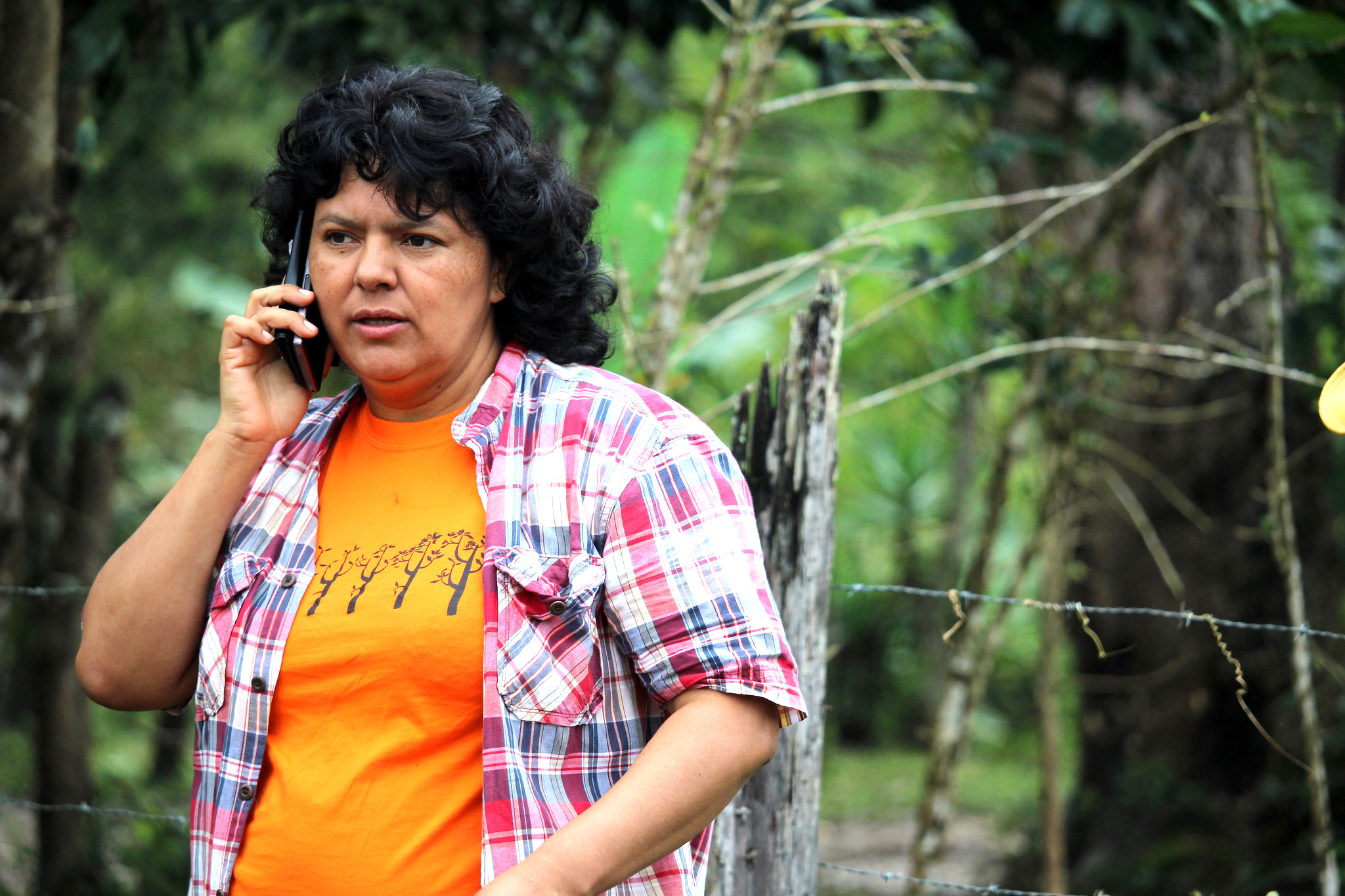
Berta Cáceres in the Rio Blanco region of western Honduras in 2015. (coolloud, Flickr, CC BY-NC-ND 2.0)
By Aviva Chomsky
TomDispatch.com
 Earlier this month, a Honduran court found David Castillo, a U.S.-trained former Army intelligence officer and the head of an internationally financed hydroelectric company, guilty of the 2016 murder of celebrated Indigenous activist Berta Cáceres. His company was building a dam that threatened the traditional lands and water sources of the Indigenous Lenca people. For years, Cáceres and her organization, the Council of Popular and Indigenous Organizations of Honduras, or COPINH, had led the struggle to halt that project.
Earlier this month, a Honduran court found David Castillo, a U.S.-trained former Army intelligence officer and the head of an internationally financed hydroelectric company, guilty of the 2016 murder of celebrated Indigenous activist Berta Cáceres. His company was building a dam that threatened the traditional lands and water sources of the Indigenous Lenca people. For years, Cáceres and her organization, the Council of Popular and Indigenous Organizations of Honduras, or COPINH, had led the struggle to halt that project.
It turned out, however, that Cáceres’s international recognition — she won the prestigious Goldman Environmental Prize in 2015 — couldn’t protect her from becoming one of the dozens of Latin American Indigenous and environmental activists killed annually.
Yet when President Joe Biden came into office with an ambitious “Plan for Security and Prosperity in Central America,” he wasn’t talking about changing policies that promoted big development projects against the will of local inhabitants. Rather, he was focused on a very different goal: stopping migration. His plan, he claimed, would address its “root causes.” Vice President Kamala Harris was even blunter when she visited Guatemala, instructing potential migrants: “Do not come.”
As it happens, more military and private development aid of the sort Biden’s plan calls for (and Harris boasted about) won’t either stop migration or help Central America. It’s destined, however, to spark yet more crimes like Cáceres’s murder. There are other things the United States could do that would aid Central America. The first might simply be to stop talking about trying to end migration.
How Can US Help Central America?
Biden and Harris are only recycling policy prescriptions that have been around for decades: promote foreign investment in Central America’s export economy, while building up militarized “security” in the region. In truth, it’s the very economic model the United States has imposed there since the nineteenth century, which has brought neither security nor prosperity to the region (though it’s brought both to U.S. investors there). It’s also the model that has displaced millions of Central Americans from their homes and so is the fundamental cause of what, in this country, is so often referred to as the “crisis” of immigration.
In the 19th and early 20th centuries, the U.S. began imposing that very model to overcome what officials regularly described as Central American “savagery” and “banditry.” The pattern continued as Washington found a new enemy, communism, to battle there in the second half of the last century.
Now, Biden promises that the very same policies — foreign investment and eternal support for the export economy — will end migration by attacking its “root causes”: poverty, violence, and corruption. (Or call them “savagery” and “banditry,” if you will.) It’s true that Central America is indeed plagued by poverty, violence, and corruption, but if Biden were willing to look at the root causes of his root causes, he might notice that his aren’t the solutions to such problems, but their source.
Stopping migration from Central America is no more a legitimate policy goal than was stopping savagery, banditry, or communism in the 20th century. In fact, what Washington policymakers called savagery (Indigenous people living autonomously on their lands), banditry (the poor trying to recover what the rich had stolen from them), and communism (land reform and support for the rights of oppressed workers and peasants) were actually potential solutions to the very poverty, violence, and corruption imposed by the U.S.-backed ruling elites in the region.
And maybe migration is likewise part of Central Americans’ struggle to solve these problems. After all, migrants working in this country send back more money in remittances to their families in Central America than the United States has ever given in foreign aid.
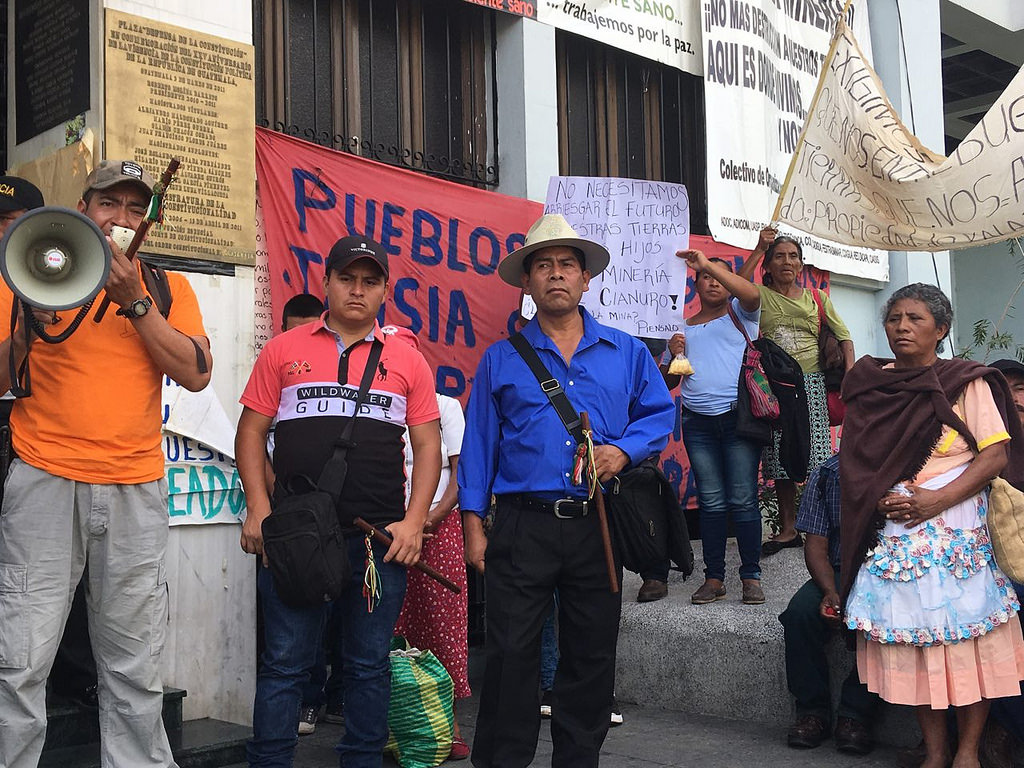
Protest of Tahoe Resources’ Escobar silver mine outside the Constitutional Court of Guatemala, May 2018. (Jackie McVickar via Flickr)
What, then, would a constructive U.S. policy towards Central America look like?
Perhaps the most fundamental baseline of foreign policy should be that classic summary of the Hippocratic Oath: do no harm. As for doing some good, before the subject can even be discussed, there needs to be an acknowledgement that so much of what we’ve done to Central America over the past 200 years has been nothing but harm.
The United States could begin by assuming historical responsibility for the disasters it’s created there. After the counterinsurgency wars of the 1980s, the United Nations sponsored truth commissions in El Salvador and Guatemala to uncover the crimes committed against civilian populations there. Unfortunately, those commissions didn’t investigate Washington’s role in funding and promoting war crimes in the region.
Please Support Our Summer Fund Drive!
Maybe what’s now needed is a new truth commission to investigate historic U.S. crimes in Central America. In reality, the United States owes those small, poor, violent, and corrupt countries reparations for the damages it’s caused over all these years. Such an investigation might begin with Washington’s long history of sponsoring coups, military “aid,” armed interventions, massacres, assassinations, and genocide.
The U.S. would have to focus as well on the impacts of ongoing economic aid since the 1980s, aimed at helping U.S. corporations at the expense of the Central American poor. It could similarly examine the role of debt and the U.S.-Central America Free Trade Agreement in fostering corporate and elite interests.
And don’t forget the way the outsized U.S. contribution to greenhouse gas emissions — this country is, of course, the largest such emitter in history — and climate change has contributed to the destruction of livelihoods in Central America. Finally, it could investigate how our border and immigration policies directly contribute to keeping Central America poor, violent, and corrupt, in the name of stopping migration.
Providing Vaccines: Even as Washington rethinks the fundamentals of this country’s policies there, it could take immediate steps on one front, the Covid-19 pandemic, which has been devastating the region. Central America is in desperate need of vaccines, syringes, testing materials, and personal protective equipment. A history of underfunding, debt, and privatization, often due directly or indirectly to U.S. policy, has left Central America’s healthcare systems in shambles.
While Latin America as a whole has been struggling to acquire the vaccines it needs, Honduras, Guatemala, and Nicaragua rank at the very bottom of doses administered. If the United States actually wanted to help Central America, the emergency provision of what those countries need to get vaccines into arms would be an obvious place to start.
Reversing economic exploitation: Addressing the structural and institutional bases of economic exploitation could also have a powerful impact. First, we could undo the harmful provisions of the 2005 Central America Free Trade Agreement (CAFTA). Yes, Central American governments beholden to Washington did sign on to it, but that doesn’t mean that the agreement benefited the majority of the inhabitants in the region. In reality, what CAFTA did was throw open Central American markets to U.S. agricultural exports, in the process undermining the livelihoods of small farmers there.
CAFTA also gave a boost to the maquiladora or export-processing businesses, lending an all-too-generous hand to textile, garment, pharmaceutical, electronics, and other industries that regularly scour the globe for the cheapest places to manufacture their goods. In the process, it created mainly the kind of low-quality jobs that corporations can easily move anytime in an ongoing global race to the bottom.
Central American social movements have also vehemently protested CAFTA provisions that undermine local regulations and social protections, while privileging foreign corporations. At this point, local governments in that region can’t even enforce the most basic laws they’ve passed to regulate such deeply exploitative foreign investors.
Another severe restriction that prevents Central American governments from pursuing economic policies in the interest of their populations is government debt. Private banks lavished loans on dictatorial governments in the 1970s, then pumped up interest rates in the 1980s, causing those debts to balloon. The International Monetary Fund stepped in to bail out the banks, imposing debt restructuring programs on already-impoverished countries — in other words, making the poor pay for the profligacy of the wealthy.
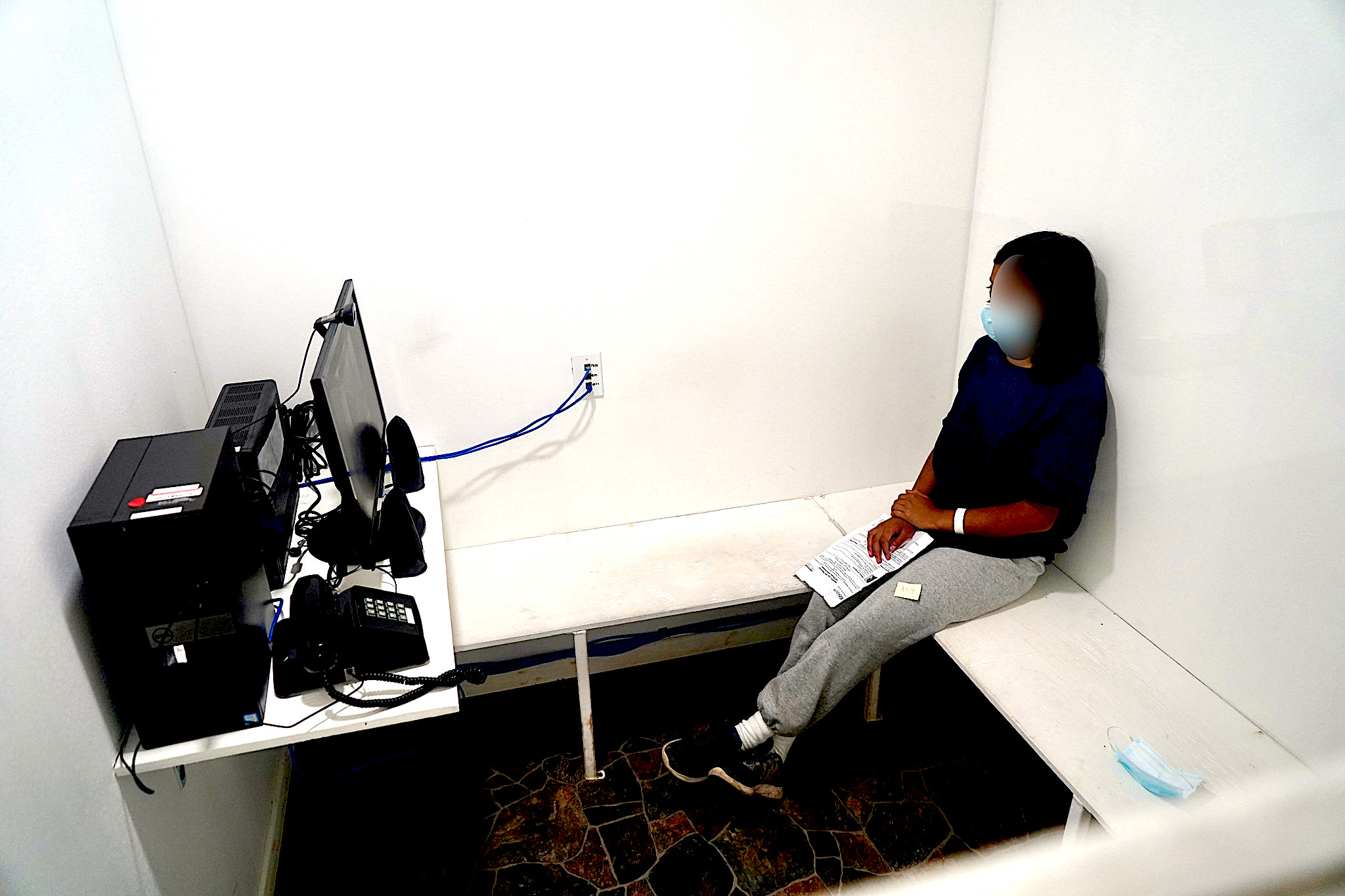
Temporary facility in Donna, Texas, for processing non-citizens, including unaccompanied children, May 4. (CBP, Flickr, Michael Battise)
For real economic development, governments need the resources to fund health, education, and welfare. Unsustainable and unpayable debt (compounded by ever-growing interest) make it impossible for such governments to dedicate resources where they’re truly needed. A debt jubilee would be a crucial step towards restructuring the global economy and shifting the stream of global resources that currently flows so strongly from the poorest to the richest countries.
Now, add another disastrous factor to this equation: the U.S. “drug wars” that have proven to be a key factor in the spread of violence, displacement, and corruption in Central America. The focus of the drug war on Mexico in the early 2000s spurred an orgy of gang violence there, while pushing the trade south into Central America. The results have been disastrous.
As drug traffickers moved in, they brought violence, land grabs, and capital for new cattle and palm-oil industries, drawing in corrupt politicians and investors. Pouring arms and aid into the drug wars that have exploded in Central America has only made trafficking even more corrupt, violent, and profitable.
Reversing climate change: In recent years, ever more extreme weather in Central America’s “dry corridor,” running from Guatemala through El Salvador, Honduras, and Nicaragua, has destroyed homes, farms, and livelihoods, and this climate-change-induced trend is only worsening by the year. While the news largely tends to present ongoing drought, punctuated by ever more frequent and violent hurricanes and tropical storms, as well as increasingly disastrous flooding, as so many individual occurrences, their heightened frequency is certainly a result of climate change. And about a third of Central America’s migrants directly cite extreme weather as the reason they were forced to leave their homes.
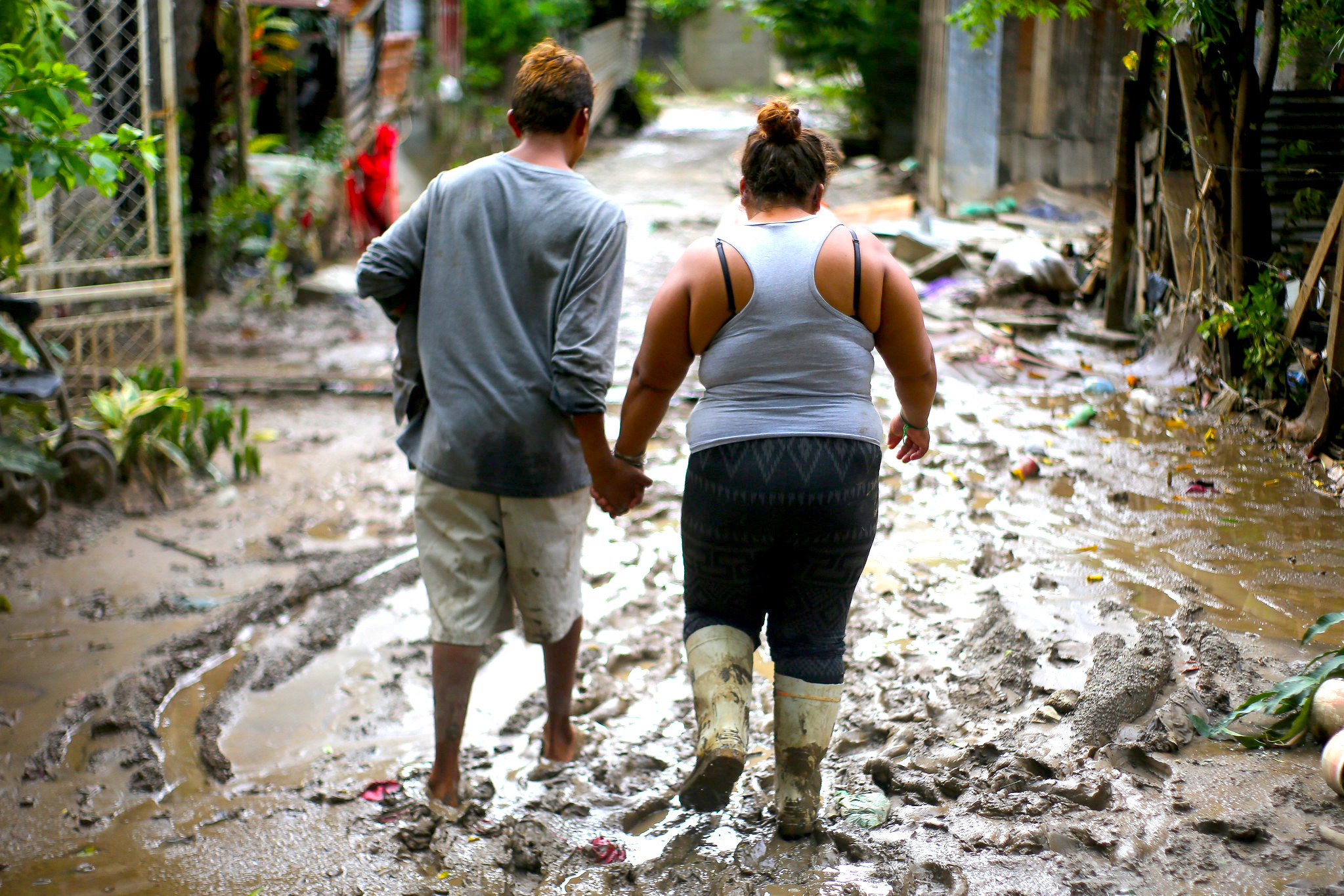
Nov. 23, 2020: After years of below-average rainfall, two hurricanes, ETA and IOTA, hit one after the other, wreaking havoc in Central America and Colombia in 2020. (EU Civil Protection and Humanitarian Aid, Flickr, CC BY-ND 2.0)
Climate change is, in fact, just what the U.S. Department of Defense all-too-correctly termed a “threat multiplier” that contributes to food and water scarcity, land conflicts, unemployment, violence, and other causes of migration.
The United States has, of course, played and continues to play an outsized role in contributing to climate change. And, in fact, the U.S. continues to emit far more CO2 per person than any other large country. It also produces and exports large amounts of fossil fuels — the U.S., in fact, is one of the world’s largest exporters as well as one of the largest consumers. And the U.S. continues to fund and promote fossil-fuel-dependent development at home and abroad. One of the best ways the United States could help Central America would be to focus time, energy, and money on stopping the burning of fossil fuels.
Migration as a Problem Solver
Isn’t it finally time that the officials and citizens of the United States recognized the role migration plays in Central American economies? Where U.S. economic development recipes have failed so disastrously, migration has been the response to these failures and, for many Central Americans, the only available way to survive.
One-in-four Guatemalan families relies on remittances from relatives working in the United States and such monies account for about half of their income. Biden may have promised Central America $4 billion in aid over four years, but Guatemala alone receives $9 billion a year in such remittances. And unlike government aid, much of which ends up in the pockets of U.S. corporations, local entrepreneurs, and bureaucrats of various sorts, remittances go directly to meet the needs of ordinary households.
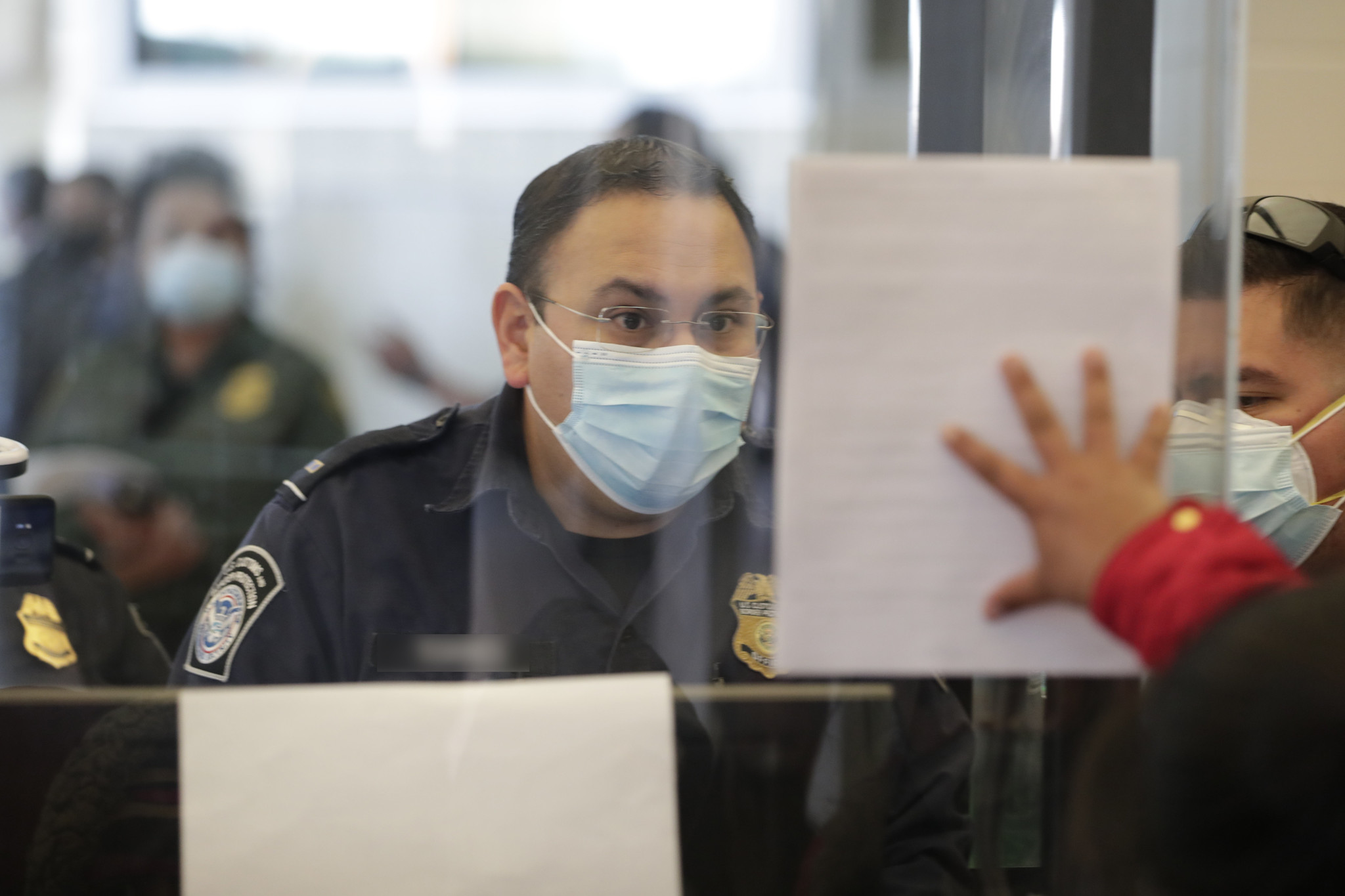
U.S. Customs and Border Protection agent processing an asylum-seeker in El Paso, Texas, Feb. 26. (CBP Flickr, Glenn Fawcett)
At present, migration is a concrete way that Central Americans are trying to solve their all-too-desperate problems. Since the 19th century, indigenous and peasant communities have repeatedly sought self-sufficiency and autonomy, only to be displaced by U.S. plantations in the name of progress. They’ve tried organizing peasant and labor movements to fight for land reform and workers’ rights, only to be crushed by U.S.-trained and sponsored militaries in the name of anti-communism. With other alternatives foreclosed, migration has proven to be a twenty-first-century form of resistance and survival.
If migration can be a path to overcome economic crises, then instead of framing Washington’s Central American policy as a way to stop it, the United States could reverse course and look for ways to enhance migration’s ability to solve problems.
Jason DeParle aptly titled his recent book on migrant workers from the Philippines A Good Provider is One Who Leaves. “Good providers should not have to leave,” responded the World Bank’s Dilip Ratha, “but they should have the option.” As Ratha explains,
“Migrants benefit their destination countries. They provide essential skills that may be missing and fill jobs that native-born people may not want to perform. Migrants pay taxes and are statistically less prone to commit crimes than native-born people… Migration benefits the migrant and their extended family and offers the potential to break the cycle of poverty. For women, migration elevates their standing in the family and the society. For children, it provides access to healthcare, education, and a higher standard of living. And for many countries of origin, remittances provide a lifeline in terms of external, counter-cyclical financing.”
Migration can also have terrible costs. Families are separated, while many migrants face perilous conditions, including violence, detention, and potentially death on their journeys, not to speak of inadequate legal protection, housing, and working conditions once they reach their destination. This country could do a lot to mitigate such costs, many of which are under its direct control. The United States could open its borders to migrant workers and their families, grant them full legal rights and protections, and raise the minimum wage.
Would such policies lead to a large upsurge in migration from Central America? In the short run, they might, given the current state of that region under conditions created and exacerbated by Washington’s policies over the past 40 years. In the longer run, however, easing the costs of migration actually could end up easing the structural conditions that cause it in the first place.
Improving the safety, rights, and working conditions of migrants would help Central America far more than any of the policies Biden and Harris are proposing. More security and higher wages would enable migrants to provide greater support for families back home. As a result, some would return home sooner. Smuggling and human trafficking rings, which take advantage of illegal migration, would wither from disuse.
The enormous resources currently aimed at policing the border could be shifted to immigrant services. If migrants could come and go freely, many would go back to some version of the circular migration pattern that prevailed among Mexicans before the militarization of the border began to undercut that option in the 1990s. Long-term family separation would be reduced. Greater access to jobs, education, and opportunity has been shown to be one of the most effective anti-gang strategies.
In other words, there’s plenty the United States could do to develop more constructive policies towards Central America and its inhabitants. That, however, would require thinking far more deeply about the “root causes” of the present catastrophe than Biden, Harris, and crew seem willing to do.
In truth, the policies of this country bear an overwhelming responsibility for creating the very structural conditions that cause the stream of migrants that both Democrats and Republicans have decried, turning the act of simple survival into an eternal “crisis” for those very migrants and their families. A change in course is long overdue.
Aviva Chomsky, a TomDispatch regular, is professor of history and coordinator of Latin American studies at Salem State University in Massachusetts. Her new book is Central America’s Forgotten History: Revolution, Violence, and the Roots of Migration.
This article is from TomDispatch.com.
The views expressed are solely those of the author and may or may not reflect those of Consortium News.
Please Support Our
Summer Fund Drive!


One possible solution could be granting employment visas for work in the U.S. Nursing Home industry.
Decent pay,housing,auto and training contracts.Employers share costs with federal Gov’t
Costly,yes .Better than cash payments to foreign governments with no accountability that waste our taxpayers money.Win win for all.
One can only hope that those Americans who frequently shout about Central American migrants will at least take the time to read this informative article by Aviva Chomsky. I am sharing it with the hopes someone does read it and will learn from it. Thank you Professor Chomsky. The fruit doesn’t fall far from the tree.
When Joe Biden opined that the solution to the ethnic strife in Iraq between Shia, Sunni and Kurd – WHICH WE HAD CREATED WITH OUR CATASTROPHIC WAR FOR OIL – Wes Clark asked which streets exactly would [Biden] designate as the dividing lines. Biden didn’t or wouldn’t take into account that there exist families with 2 or 3 of those sects living together and which once got along with each other before our invasion.
The longstanding crime of our foreign policy is aiding and abetting the short term financial interests of conglomerate corporate predators including aggressive too big to fail banks while ignoring the basic rights of indigenous peoples.
This country will not recover its soul until the Joe Bidens and Kamala Harris’s quit saluting the profiteers and start paying attention to what’s right for the vast majority of people both at home and abroad.
Biden and Harris must face up to the major challenges of our time – climate disruption and nuclear war….instead of ignoring how our foreign policies feed into those dangers.
Does Biden have the character and courage to follow the straightforward guidance that Aviva Chomsky proscribes? Hard to find much evidence of that, sadly…
Improvements in guest worker programs and SSN reforms would decrease the number of undocumented
workers who falsely use someones ssn yet pay into Social Security Adm.thru deductions from wages.
ESF Earnings Suspense File
maintained by SSA .
Billions $ money pouring in
creates a mismatch or a
scrambled earnings File when wages are reported with a stolen or fake SSN.
This creates a problem for the number holder 1st person ssn wage earner who files for benefits and gets delays.The other (2nd person )not authorized to work and paying into the fica system will not get proper credit until those wages are corrected and removed from the Suspense file.
ESF is benefiting SSA as well as creating heavy work loads
for IRS and SSA.
Biden’s plans for Latin America are transparent and continue the “no coup” approach that Hillary exercised in Honduras;
hXXps://thegrayzone.com/2019/07/28/biden-privatization-plan-colombia-honduras-migration/
Not so different from Perkin’s “Confessions of an Economic Hitman”, the unofficial policy of the US to all third world global south countries.
Every other developed country in the world has a system of work permits and VISAs to protect both the immigrant labor force and the indigenous labor force. Yet US businesses dependent on exploiting illegal immigrants both in pay and working conditions donate lots of money to politicians in both parties. Illegal immigration is a system of slavery. It could easily be remedied, but instead remains a useful Election issue. Who put immigrant children in cages? Obama, Trump and Biden– everyone knew that all along.